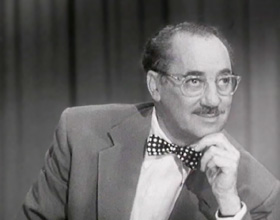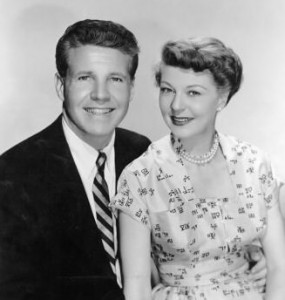Previous Posts: 71-75, 76-80, 81-85, 86-90, 91-95, 96-100
70) Groucho Marx
 Groucho Marx’s greatest claim to fame was as the ringleader of the Marx Brothers. In his zany character, he has delighted millions. His radio story was more complex. In the early ’30s, he and Chico starred in Five Star Theater as two characters right out of their films. Though all but one episode and two excerpts have been lost, the series was recreated brilliantly by the BBC as Flywheel, Shyster, and Flywheel. After this though, Groucho struggled to find his place as a solo performer. In 1943, he headed up a typical comedy variety program called Blue Ribbon Town, similar to programs hosted by Jack Benny, Bob Hope, and Eddie Cantor, but it didn’t really fit Groucho who left one season. In 1947, he found his place as host of You Bet Your Life, one of radio’s most beloved and collected radio game shows. Ostensibly, it was a quiz show, but really the highlight was Groucho questioning each week’s guests. It showed a different side of Groucho than his earlier movies. He was still wise-cracking, but he was more mature and calmer than his big screen archetype. Groucho’s program easily made the leap to television but continued to be simulcast over the radio until its end in 1961.
Groucho Marx’s greatest claim to fame was as the ringleader of the Marx Brothers. In his zany character, he has delighted millions. His radio story was more complex. In the early ’30s, he and Chico starred in Five Star Theater as two characters right out of their films. Though all but one episode and two excerpts have been lost, the series was recreated brilliantly by the BBC as Flywheel, Shyster, and Flywheel. After this though, Groucho struggled to find his place as a solo performer. In 1943, he headed up a typical comedy variety program called Blue Ribbon Town, similar to programs hosted by Jack Benny, Bob Hope, and Eddie Cantor, but it didn’t really fit Groucho who left one season. In 1947, he found his place as host of You Bet Your Life, one of radio’s most beloved and collected radio game shows. Ostensibly, it was a quiz show, but really the highlight was Groucho questioning each week’s guests. It showed a different side of Groucho than his earlier movies. He was still wise-cracking, but he was more mature and calmer than his big screen archetype. Groucho’s program easily made the leap to television but continued to be simulcast over the radio until its end in 1961.
69) Martha Wilkerson (G.I. Jill)
During World War II, many fought the morale war and none did better than Wilkerson. When the war launched, many programs were made for soldiers often featuring celebrity hosts. One such program was G.I. Jive with its selection of hot much. Early episodes feature such professionals as Frank Nelson and Donna Reed. However, they would be replaced by an unknown who would quickly become known to forces overseas as G.I. Jill. Recorded in Los Angeles, Jill’s warm and friendly voice was a big slice of home to war-weary soldiers. She was the ultimate girl next door. She made the perfect counter to Japanese efforts to undermine morale in the person of Tokyo Rose. With superior records and a winning personality and her recordings of fifteen minute daily GI Jive show and her half hour Jill’s All-Time Jukebox, Wilkerson helped to win the morale war and her recordings are much beloved by golden age radio fans today.
68) Basil Rathbone
Basil Rathbone is intrinsically linked with the character of Sherlock Holmes. He starred in two movies for Fox in 1939 after which there were to be no more Holmes films. The film series ended and in 1939 the show was taken to the radio for a 24 week series over the Blue Network. That series proved so popular, that 2 more seasons followed over radio with the 1941-42 series landing a solid 14.6 on the Hooper rating. Without the radio series, it’s doubtful that Rathbone and Bruce would have made the next twelve movies in the series for Universal from 1942-46. But they did. With the war on, Sherlock Holmes was even more important as a symbol to the American people, so after more than a year’s absence the series returned and ran for 108 weeks straight from May 3 1943-May 28, 1945 without a break. The series got to be too much for Rathbone who, despite an offer of more money, was getting tired of Holmes and insisted that if he continued in the role, the series move to New York after the 1945-46 season. The producers refused and did one more season in Hollywood with Tom Conway before moving to New York for two seasons with John Stanley. Rathbone’s definitive performance as Holmes led to soundalike successors that had audiences believing he was still on Sherlock Holmes three seasons after he left. In addition to Sherlock Holmes, Rathbone starred in Scotland Yard and then played himself in a comedy mystery series, Tales of Fatima. Outside of the Holmes character, Rathbone remained a presence as a true dramatic actor with several appearance on Theater Guild on the Air. He made ten appearances on Cavalcade of America starring as such noted Americans as John Jay, George Washington, Thomas Jefferson, Thomas Paine, and Oliver Wendell Holmes.
67) Ozzie and Harriet
 Ozzie and Harriet would define an era in American life and they began over radio. Ozzie Nelson was a band leader for Red Skelton and his wife Harriet was a single. When Skelton was drafted, the couple got their own program, the Adventures of Ozzie and Harriet. The program would be a sensation. It would be emblematic of everything right or everything wrong with traditional values depending on your viewpoint. The series began over radio and continued on television until 1966, some 22 years after it started. The talented couple also lent their combined efforts to programs like Suspense and Family Theater, providing an interesting contrast to their work on Ozzie and Harriet.
Ozzie and Harriet would define an era in American life and they began over radio. Ozzie Nelson was a band leader for Red Skelton and his wife Harriet was a single. When Skelton was drafted, the couple got their own program, the Adventures of Ozzie and Harriet. The program would be a sensation. It would be emblematic of everything right or everything wrong with traditional values depending on your viewpoint. The series began over radio and continued on television until 1966, some 22 years after it started. The talented couple also lent their combined efforts to programs like Suspense and Family Theater, providing an interesting contrast to their work on Ozzie and Harriet.
66) Frederick ZIv
As network radio and television grabbed hold, Frederick Ziv became the king of first run syndication. Ziv’s productions are beloved by fans for their high quality and star power. He produced nearly every type of program that you could imagine: Detective shows like Boston Blackie, Manhunt, and Philo Vance, an anthology series with Favorite Story, a Western in The Cisco Kid, a Horror program caled Weird Circle, adventure programs like Bold Venture and I Was a Communist for the FBI, and even a political drama called Freedom USA. In addition to this, Ziv’s programs attracted some of Hollywood’s best and brightest including Bogart and Becall in Bold Venture, Tyrone Power in Freedom USA, and Fred Macmurray in Bright Stars. Ziv’s programs have delighted listeners and the fact that the shows were intended for rebroadcast has made transcription disc abundant and made them easy to collect. The other big winners in Ziv’s production were local businesses who couldn’t sponsor a show like Suspense but could sponsor Weird Circle. Thanks to Frederick Ziv, local companies could bring people quality programming to promote their business and be able to compete for listener loyalty with large national chains as well as playing their own unique part in the golden age of radio.
If you enjoyed this post, you can have new posts about Detective stories and the golden age of radio and television delivered automatically to your Kindle.
